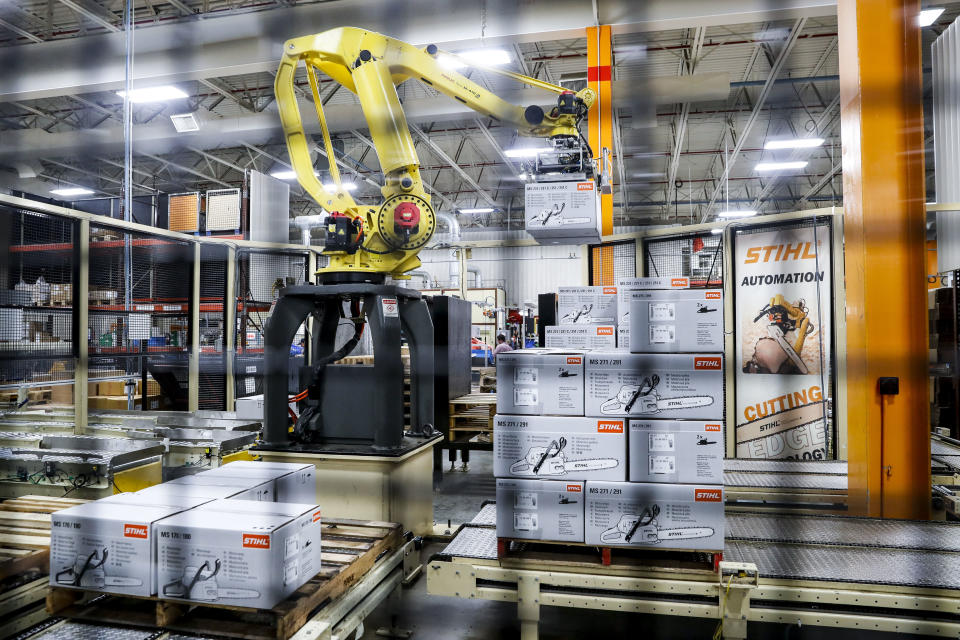These 10 stories will drive investing for the next decade
The U.S.-China trade war is a sign that the world has reached peak globalization. That’s just one of 10 themes that Bank of America-Merrill Lynch is flagging for the next decade.
“I do believe that peak globalization is here,” said Haim Israel, head of global thematic research at BAML, on Yahoo Finance’s On the Move. “We are facing massive demographic challenges, environmental challenges, economic challenges, and countries and sovereign governments are going to have to start taking care of themselves first. We’re already there.”
Israel pointed out that after the fall of the Berlin Wall, there were only 15 physical borders around the world. Today, there are 77.
The globe is already experiencing many of the trends that characterize peak and post-peak globalization, according to the BAML note, including trade wars and tariffs, populism and reshoring and location production. Investors can take advantage by favoring real assets, such as commodities, farmland and real estate, over financial assets, Israel and his colleagues wrote. Within financial assets they do own, they should favor shares of defense and infrastructure companies.
Here are BAML’s other themes for the next decade; direct quotes are from the report:
2. Recession: The bursting of the current “bond market bubble” could trigger a global recession, as a potential policy mistake could “cause a jump in interest rate volatility.” One of the results could be disorderly deleveraging on Wall Street and among corporations that have built up enormous debt loads.
3. Quantitative failure: “Monetary policy impotence” or as many strategists and economists have recently put it, “pushing on a string,” “refers to the diminishing returns from increasingly activist central banks & their use of monetary policies to reflate the economy.” If the U.S. joins Europe and Japan in implementing negative interest rate policies, banks could be particularly vulnerable.
4. Demographics: In addition to peak globalization, the world is reaching “peak youth”: in the next decade, the number of people over 65 is expected to overtake the number of children under age 5 for the first time ever. A number of sub-themes will emerge from this demographic shift, such as a rising savings rate and opportunities to invest in new health care technologies related to the aging population; the rise of the emerging market middle class; and growth in existing trends like sustainability and the sharing economy.
5. Climate change: Israel said we’re at an inflection point: “We knew about climate change for years. This is the decade where climate change is reaching a boiling point. If we’re not going to have a solution this decade, we’re reaching the point of no return.” The next decade could be characterized by “climate-induced immigration, inequality and unemployment” but also new clean energy solutions. To wit, “BAML estimates that the clean energy market is already worth US$300bn, while the global waste industry presents a US$2tn opportunity. Likewise, water infrastructure will need a minimum cumulative investment of US$7.5tn to 2030E to keep up with projected growth.”

6. Splinternet: The U.S.-China trade war will transition to a tech war, with the two nations battling for superiority in quantum computer and artificial intelligence. “BAT” — Baidu, Alibaba and Tencent — might be better positioned than the FAANG companies “to take advantage of AI and big data developments as key megatrends drive further potential growth in China.”
7. Moral capitalism: The 2020s will see the rise of impact investing and stakeholder capitalism in more dramatic fashion, with $20 trillion in assets under management flowing into so-called ESG strategies — those that prioritize environmental, social and governance factors — over the next 20 years. Increasing women’s equality will also be an important driver of global economic growth.
8. Robots and automation: The next generation of robotics could put 50% of jobs at risk globally by 2035. This could have implications for the manufacturing sector beyond job loss, however, including disrupting supply chains and enabling more locally-based production. There are an array of related investing themes, from autonomous vehicles to medical robots.

9. Smart everything: There will be 500 billion connected devices by 2030, up from 30 billion today. That will feed into trends like 5G (and 6G), smart cities, the growing Internet of Things, and a more efficient electricity grid. It is also likely to come at the cost of personal privacy.
10. Space: We’re approaching the “decade of space democratization” and a “new space age.” that could make for a $1 trillion market by 2030, fueled by space tourism and nanosatellites that could extend web connectivity. Reusable rocket technology, falling costs and deep-pocketed, enthusiastic billionaires like Jeff Bezos and Elon Musk are expected to further spur the trend.
Julie Hyman is the co-anchor of On the Move on Yahoo Finance.
Related headlines from Yahoo Finance:
The biggest deals and attempted deals of the 2010s
Stock Market 2020: Strategists say trade progress is key
Follow Yahoo Finance on Twitter, Facebook, Instagram, Flipboard, SmartNews, LinkedIn, YouTube, and reddit.

